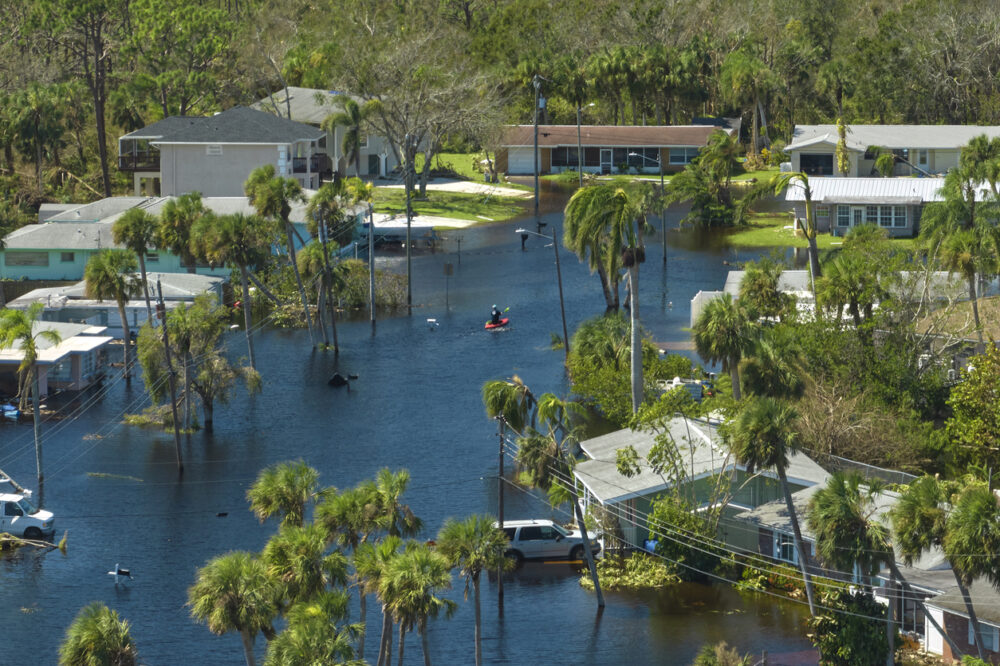What the Climate Crisis Means for Financial Health
With the increasing cost of climate change and its long-term ramifications on financial health, the Financial Health Network recognizes this urgent issue and is taking action.
-
Program:
-
Category:

Climate change and weather events are an increasingly salient part of life for many people living in the United States. Between 2018 and 2023, the National Oceanic and Atmospheric Administration recorded 20.5 natural disasters that cost $1 billion or more, more than double the 40-year historical average of 8.5 billion-dollar disasters per year.1 Three out of every four people (78%) living in the United States reported they were directly impacted by at least one extreme weather event during a similar period, with communities of color and Financially Vulnerable consumers disproportionately at risk of experiencing a weather event.2, 3
As weather events have become more common and growing shares of Americans are directly impacted, U.S. financial health has declined. The Financial Health Pulse® 2023 U.S. Trends Report showed that 17% of Americans were Financially Vulnerable, representing an increase to levels not observed since 2019. Reflecting the myriad factors likely contributing to this shift, financial health eroded across all aspects of financial life, from spending to saving, borrowing, and even financial planning. The increasingly tenuous financial health of those living in the United States may be partially driven, and further undermined, by climate change.
Short-Term Implications on Financial Health
Climate Change’s Short-Term Impact on Financial Health Creating Unexpected Financial Shocks That Challenge Financial Health
In part, climate change can impact financial life by generating a financial shock that affects household finances. Natural disasters and extreme weather events may lead to unexpected employment disruptions and delays in the receipt of public benefits, reducing the flow of income into a household. Extreme weather events can also result in the loss of life, property, and belongings, creating unforeseen expenses for families. These changes to income and spending may all compromise financial health. In fact, recent research shows that communities affected by a medium-sized disaster saw credit scores decline by as much as 22 points, while the amount of debt in collections increased by roughly 10% over four years post-disaster.4
By cushioning households against some of these unforeseen expenses, insurance may help manage some financial shocks associated with a weather event. However, recent findings from the Financial Health Network’s Pulse research series, supported by the Principal Foundation and Citi Foundation, shows that residents of states that experience higher-than-average losses from natural disasters less frequently carry residential insurance. As insurers raise their rates and pull out of disaster-prone areas, residents of these communities may find themselves on their own in managing housing and property expenses associated with damage from a weather event.
Insurance coverage is not the only resource families turn to in the wake of a disaster. Based on Financial Health Network research and from conversations with Financial Health Network Members and community organizations, access to funds before, during, and after a disaster is a key way to support communities as they recover from a disaster. However, 5.9 million households in the United States do not have bank accounts, so accessing these funds will be challenging.5 Furthermore, interruptions to financial services because of utility disruptions, temporary closure of bank branches, and the destruction of personal financial records can make it challenging even for banked consumers to access these funds.6 Fortunately, we are already seeing the rise of innovative solutions – the disbursement of gift cards, more awareness of the importance of a financial “go kit,” and creative cross-sector partnerships – to get funds into the hands of affected communities.
The Long-Term Effects of the Climate Crisis
Climate Change’s Lasting Financial Impact
In addition to the disruptions wrought in the immediate aftermath of a disaster, weather events also have long-term financial implications for communities. Although more research is needed, there is concern that property values decline in the wake of a weather event.7 Not only will this affect existing homeowners whose net worth may be depleted as their home loses value, but it also has ramifications for the financial health of future homebuyers. As housing costs rise in other parts of the country, some consumers may be pushed into these disaster-prone areas, putting them at financial risk and dampening their potential for wealth accumulation.
Climate change also has the potential to dramatically increase the cost of living in communities through increased spending on energy and the price of goods. To keep themselves safe and comfortable during heat waves and extreme cold snaps, households may consume more energy. Moreover, climate events in one part of the country can disrupt food supply or oil production, increasing costs both in the affected community and throughout the country. There is concern that the increasing cost of living will be particularly challenging for low-income households who allocate a larger share of their budget to food and utilities, with the risk of increasing the number of Americans experiencing food insecurity.8
These longer-term financial health challenges associated with climate change may not capture the public imagination and dominate newspaper headlines the way that the extreme shock in the immediate aftermath of a disaster does. But addressing these financial challenges is no less urgent. The work to be done will require considerable thought leadership across sectors to achieve systems-level change that can make financial health for all possible.
How We’re Taking Action
Recognizing the Urgency of the Climate Crisis and Taking Action
The Financial Health Network is ready to take action. To start, we firmly believe in the maxim of “what gets measured gets managed,” and we are primed to lead a new research agenda on climate change. In addition to reporting on the financial health of individuals living in disaster-prone areas in our forthcoming Financial Health Pulse® 2024 U.S. Trends Report, we also plan to investigate questions that will help financial institutions and employers take action and support the financial lives of their customers and employees, such as how true financial inclusion may be dependent on securing access to funds at any moment, even in the aftermath of a disaster.
Our research will also consider how rising energy costs, utility disruptions, and declining property values are reshaping where Americans want to live and the implications for access to bank branches and work. And we remain deeply invested in highlighting how the impact of disasters varies across communities – with an eye toward urban and rural differences – and a focus on the challenges disproportionately experienced by Black, Latine, and Asian households.
The Financial Health Network is also taking action as a partner in the Discover Financial Health Improvement Fund, an initiative supporting innovative startups who are working to improve the financial health of low- and moderate-income communities. One such innovative company participating in the Discover Fund is iink Payments, which accelerates the disbursement of insurance claim funds in order to improve community resilience in the aftermath of a natural disaster. Read our Q&A blog with iink Payments CEO and Co-Founder Tom McGrath to learn more.
We have also established ourselves as a conversation-starters around the issue of climate change. For instance, at our 20th Anniversary EMERGE convening in Chicago, we convened a panel discussion of leaders and researchers from Raincoat, Loyola University Chicago, SaverLife, and Rand to discuss the implications of climate change. We also featured Anne Evens, CEO of Elevate, on our EMERGE Everywhere podcast episode who shared how we can drive equity through climate action featuring.
The Financial Health Network recognizes climate change as one of the most urgent issues of our time, which will necessitate cross-sector collaborations to identify solutions and build toward a more resilient future. We welcome all of you to partner with us and promote this work as we seek to secure Americans’ financial health in the face of unprecedented financial challenges due to the climate crisis.
This article originally appeared in our EMERGE magazine as part of our 2024 EMERGE Financial Health conference. Watch the insightful sessions and learn more about how you can improve financial health for all.
- Adam B. Smith, “2023: A historic year of U.S. billion-dollar weather and climate disasters,” Climate.gov, January 2024.
- “Poll: Facing extreme weather is changing Americans’ views about the need for climate change action,” Harvard T.H. Chan School of Public Health, June 2022.
- Caroline Ratcliffe et al., “Insult to Injury: Natural Disasters and Residents’ Financial Health Highlights,” Urban Institute, April 2019.
- Caroline Ratcliffe et al., “Insult to Injury: Natural Disasters and Residents’ Financial Health Highlights,” Urban Institute, April 2019.
- “2021 FDIC National Survey of Unbanked and Underbanked Households,” Federal Deposit Insurance Corporation, last updated July 2023.
- Sheida Elmi, Bianca Lopez, & Shehryar Nabi, “A Gathering Storm: Why The Growth in Climate Hazards Matters for Household Financial Security,” The Aspen Institute, March 2024.
- “The Impact of Climate Change on American Household Finances,” U.S. Department of the Treasury.
- Ibid.
